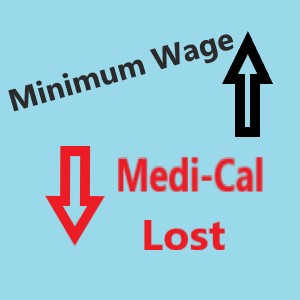
A small $1 increase in the minimum wage can an individual no longer eligible for Medi-Cal.
As the minimum wage for California increased at the beginning of the year, individuals will find they are making more money and this increased income will impact some people enrolled in Medi-Cal. The extra dollar per hour of the minimum wage increase will mean that some people are earning more per month than what Medi-Cal allows based on the federal poverty levels. MAGI Medi-Cal beneficiaries have agreed to report any changes to income within 10 days of the increase. This means Medi-Cal county offices should be receiving numerous income changes from people in minimum wage jobs who are enrolled in Medi-Cal health plans.
It may not seem like a $0.50 or $1 per hour increase in the hourly wage could make that much difference, but it can. I’ve been contacted by several people who have had an increase in their hourly wage and are wondering how long they can wait before the report it to Medi-Cal. The new minimum wage increase has made them ineligible for Medi-Cal by their estimates. Eligibility for Medi-Cal in California is based on a a Modified Adjusted Gross Income of under 138% of the federal poverty level (FPL). For 2018 this translated into $1,397 per month for a single adult.
Increased Minimum Wage Can Trigger Medi-Cal Loss
The 2019 federal poverty levels will be released sometime in January or February and implemented into the Medi-Cal eligibility system usually in March or April. However, the new FPL dollar amounts, once loaded into the computer system, will be retroactive to the first of the year according to information provided by Covered California Explaining Medi-Cal & Covered California Federal Poverty Level Income Amounts. Under the 2018 FPLs, a single adult working 30 hours per week earned $1,320 per month, which made them eligible for Medi-Cal. A $1 increase, at the same number of hours, raised their wages to $1,440 making them ineligible for Medi-Cal.
The $1 increase in wages per hour between 2018 and 2019 is an 8% increase. The FPL has been increasing approximately 1% every year. But if we assume the FPL increases 2% that would put the new Medi-Cal monthly income level at $1,425. The increased minimum wage for 2019 still makes the individual working 30 hours per week ineligible for MAGI Medi-Cal.
From Medi-Cal To Covered California
Once Medi-Cal has been terminated because the monthly income has increased, the individual can go to Covered California and enroll in a private health plan with the tax credit subsidy. The downside is that private health insurance through Covered California increases the out-of-pocket costs for people right on the margins of Medi-Cal eligibility. A monthly income of $1,440 equates to an annual household income of $17,280. This level income qualifies the individual for an Enhanced Silver 94 plan with reduced copayments, coinsurance, and deductibles.
There is also a subsidy to reduce the health insurance premium to the consumer. For a 30-year-old adult, earning $17,280 per year, in selected regions, the least expensive Silver 94 plans for 2019 are-
Sacramento: Blue Shield HMO at $34.85
San Francisco: Chinese Community Health Plan HMO at $40.38
Los Angeles: L.A. Care Covered HMO at $33.96
For people with medical conditions and frequent doctor visits, you can tack on another $30 to $40 per month. The additional health insurance premium costs and medical expenses may lead some people to cut back their hours to become Medi-Cal eligible.
Medi-Cal Beneficiaries Agree To Report Changes To Income
Some people have assumed that Medi-Cal automatically knows when they received and increase in wages, but that is not true. There are instances when the local county Medi-Cal offices learn of a wage increase or decrease. I am not sure if this from a random audit, a systematic process, or some other bit information that triggers it. In most of the instances I am familiar with, the individual or family has their income estimates reduced by a county Medi-Cal eligibility worker in Covered California resulting in Medi-Cal eligibility.
I have not heard of any cases were Medi-Cal has terminated enrollment based on increased wage information that they may have received from some agency like the Employment Development Department. Generally, a current Medi-Cal beneficiary must report a wage increase and often times document it before Medi-Cal will terminate enrollment. The default position is to err on the side of protecting people and not terminating medical coverage until all the conditions have been met for ineligibility.
If you are enrolled in Medi-Cal, and your income increased because of the higher minimum wage rates for 2019, you need to report it to Medi-Cal. This doesn’t mean you are ineligible for Medi-Cal or that you will be terminated. MAGI Medi-Cal also looks at the number of persons in your tax household, along with their ages for determining eligibility. The best course of action is to report the wage increase along with the estimated number of hours you are working, which may be higher or lower than in previous months. Medi-Cal will make a determination on your eligibility from there. If you don’t like their determination, you can always appeal their decision.